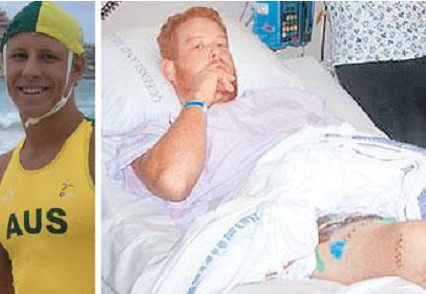Kelmeny Fraser
From: The Sunday Mail (Qld)
January 10, 2010 12:00AM

TRAGEDY: Lifesaving star Jacob Lollback (left) at Bondi Beach in 2007; and Luke Randell who was injured by a propeller while spear-fishing in 2006.
THEY were in the prime of their lives, physically fit and experienced in the water. But for each, a simple spear-fishing trip – something they had done dozens of times before – ended in disaster.
A series of high-profile deaths and shocking injuries of young sportsmen while spear-fishing, including the death of 20-year-old Gold Coast ironman Jacob Lollback on September 22, has led to plans for a major new safety campaign.
One of those working on the campaign is New South Wales man James Sakker, who was on the same fateful five-day spear-fishing trip 75km northeast of Gladstone as Jacob Lollback.
A decision on whether an inquest would be held is yet to be made, but Lollback is believed to have drowned after blacking out in shallow water while spear-fishing, which involves free- diving or diving without oxygen tanks.
Lollback was a rising surf lifesaving star who had moved to the Gold Coast to compete after 15 years of lifesaving.
His age and physical fitness created a swirl of questions about how he could lose his life in the water. Mr Sakker is now working on a spear-fishing safety DVD, to be released for sale next year in dive shops. “It was a terrible tragedy and obviously I am deeply disturbed by it happening,” Mr Sakker said.”I decided I had to try to improve safety in the sport and get the message out to other divers.
“There are a lot of new people getting into the sport, and the majority are not members of
clubs so they are learning from magazines and internet forums and things like that.”
Shallow water blackout has been described as the curse of the fittest and most experienced divers, who are more likely to push their bodies to the limit.
Mr Sakker said divers could be caught out thinking they had more oxygen left than theyactually did, as the body used less oxygen at a depth of 10-20m as it was under pressure giving the impression there was plenty of air left.
On surfacing, that pressure lessened and the lungs returned to their normal size, which could rapidly suck oxygen out of the blood and lead to a sudden lack of consciousness, often just before or after surfacing.
The accident was not a one-off, with Victorian television fishing show presenter Neil Tedesco drowning while free-dive training at a local gym pool in Frankston, sending shockwaves through the fishing community.
In November last year, popular 21-year-old Sunshine Coast university student and experienced diver Jason Palmer drowned while on a spear-fishing trip off Caloundra.
Spear-fisherman Mark Bryant, 31, also lost his life while free-diving off the Tweed Coast in early 2004. Many attributed the death to a blackout.
There have also been horrific injuries, including those of a Sunshine Coast man who was hit by a boat propeller in June last year at Flinders Reef, breaking his femur, tibia, fibula and ribs, puncturing his left lung and rupturing his spleen, kidney and bowel. He spent two weeks in an induced coma and suffered a stroke. Luke Randell, of the inner-city suburb of Clayfield, is lucky to be alive after being hit by a propeller while spear-fishing at a shipwreck at Main Beach on the Gold Coast in 2006, leaving him in hospital for six weeks. The blade missed a major artery by 5mm, which would have sealed his fate.
